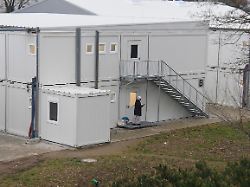Meeting canceled without result
States are biting the ball when it comes to the refugee issue with the federal government
September 25, 2023, 8:31 p.m
Listen to article
This audio version was artificially generated. More info | Send feedback
States and municipalities are groaning under what they see as the excessively high number of refugees and the associated costs. They are demanding more money from the federal government for accommodation and integration. But the Ministry of Finance is holding back. Apparently a reduction in grants is even planned for 2024.
The struggle for a cross-party Germany pact on the issue of migration is burdened by a bitter federal-state dispute over finances: The work of the federal-state working group on financing the costs of accepting and caring for refugees was canceled without any result. The reason: The states were outraged that the federal government was offering them too little money. The Ministry of Finance confirmed that the technical level meeting ended inconclusively. This threatens that there will no longer be any agreement before the planned consultations between the Prime Minister and the Chancellor on November 6th. “The federal government is still willing to talk,” said a spokesman for the Federal Ministry of Finance.
At the weekend there was a convergence of positions on migration policy between the traffic light government and the opposition Union. Federal Interior Minister Nancy Faeser had agreed in principle to set up stationary border controls on the border with Poland and the Czech Republic. Chancellor Olaf Scholz, in turn, had called for a more decisive course on deportations.
CSU leader Markus Söder accused the federal government of saying that Germany’s commitment “when it comes to returns is not at all apparent.” You would have to sign contracts with countries in the Maghreb or with Turkey. The federal government, in turn, accuses the states responsible for deportations of not tackling the issue decisively enough.
Countries want capitation rates
However, this course is controversial in the traffic light government made up of the SPD, Greens and FDP. “These border controls at the border posts make no sense because irregular migration does not come about in the first place,” said Green Party co-leader Omid Nouripour in Berlin. “She comes between the border posts.” Mobile control teams would therefore be more important. A spokesman for the Federal Ministry of the Interior said in Berlin that stationary border controls always have to be limited in time. Faeser has already spoken to her Czech counterpart. This will follow with Poland.
Government spokesman Steffen Hebestreit said the government supports the municipalities. Further measures would be discussed at a federal-state meeting in November. This is exactly what could now be overshadowed by the financing dispute. Because of the sharp increase in the number of arriving migrants and refugees, the 16 federal states have been insisting on more money from the federal government since the spring. They would ideally like to return to a system of capitation payments in which federal payments would be based on the number of participants. In May, Chancellor Scholz promised the heads of government of the federal states a revision of the financing.
The federal government wants to cut grants
But now the federal government has announced to the states a significant reduction in federal aid for costs in 2024, it was said in participants’ circles. In a video link, the states were told that the federal government only wanted to help them and the municipalities with a maximum of 1.7 billion euros next year instead of 3.75 billion euros as in 2023. In view of the increasing number of refugees and the burdens in the municipalities, this was met with great incomprehension by the federal states and was viewed as unacceptable.
In the future, the federal government also wants to contribute significantly less to the costs for those refugees who have been in Germany for a long time, it was said. The federal government’s contribution to the costs of states, cities and municipalities for the integration, schooling and care of refugees from Ukraine should be eliminated. The spokesman for the Ministry of Finance emphasized that “the federal states are essentially responsible for the accommodation and care of refugees.” However, the federal government is aware of the national dimension.
State circles warned that the cross-party Germany pact offered by the Chancellor, which also covers the issue of migration, was inconceivable without a viable solution to the financing issues.
